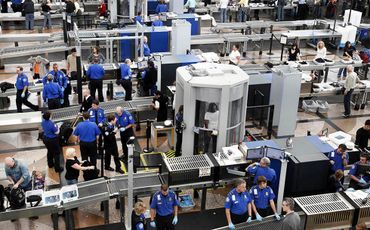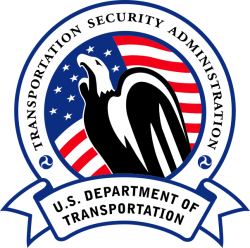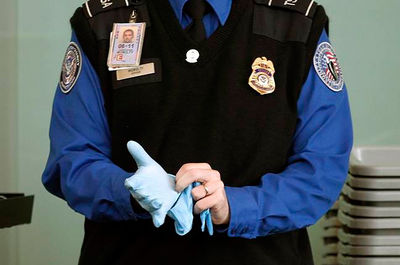TSA
 | |
 | |
| Parent organization | US/Department/Homeland Security |
| Headquarters | Pentagon City, Arlington County, Virginia |
| Leader | Administrator of The Transportation Security Administration |
| Staff | 55,600 |
| Subpage | •TSA/Administrator |
| Formed just after 9-11, this agencies conditions the citizenry to undergoing invasive control measures, best understood as "security theatre". Their competency can be measured by their requirement that travellers only use a locks which can be opened by a master key, that they posted images of online. | |
The Transportation Security Administration was set up after the events of September 11, 2001, with the nominal aim of increasing passenger security. A senior TSA manager turned whistleblower reports that the agency has toxic culture and poor morale.[1]
Contents
Official narrative
This agency makes people safer by checking for bombs or dangerous items aboard planes. Their right to require some passengers[2] submit to carcinogenic X-ray scanning has saved lived saved the concomitant decrease in attacks by "terrorists". Citizens should be glad that it plans to roll out such invasive checks across the travel system. The introduction of watch lists are not to prepare for a totalitarian control grid, but for passenger safety.
Problems
The procedures of the TSA (and similar agencies worldwide) are not backed up by evidence of their effectiveness at reducing terrorism. For example, the "liquid bomb plot" has never been shown to be possible and James Petras has termed it a "hoax"[3] while Nigel Wylde, a former senior British Army Intelligence Officer, termed the police and government story about the "terror plot" part of a "pattern of lies and deceit."[4]
Security theatre
Security expert Bruce Schneier describes the ban on liquids as "security theater"[5] i.e. something which is carried out for their impact on people's minds, rather than for the purpose of increasing 'security'.[6]
SPOT program
From 2007 through 2015, the TSA ran a program called SPOT ("Screening of Passengers by Observation Techniques") program, staff scrutinised passengers for 'suspicious' behavior. In 2013, the US Government Accountability Office concluded that there was no evidence the SPOT program, which was employing 2,800 people, was at all effective.[7] Only 14 percent of passenger flaggings by TSA officers led to a referral to law enforcement. Only 0.6 percent of TSA flaggings led to an arrest. None of those arrests were designated as terrorism-related.
“[The TSA] concluded in 2013 that there's no evidence the agency's SPOT program, which employed 2,800 as of the study and attempts to scan passengers for suspicious behavior, is at all effective. Only 14 percent of passenger flaggings by TSA officers led to a referral to law enforcement. Only 0.6 percent of TSA flaggings led to an arrest. None of those arrests were designated as terrorism-related. What about the most loathed TSA rules: the shoe removal requirement, and the ban on all but the tiniest containers of liquids? There's never been any evidence that these are effective.”
(17 May 2016) [8]
According to the ACLU, "the TSA has repeatedly claimed that the behavior detection program is grounded in valid science, but the records that the ACLU obtained show that the TSA has in its possession a significant body of research that contradicts those claims." The Register reported in 2017 that "documents suggest the TSA exaggerated the science supporting its methods in its communication with Congress and government auditors, or failed to disclose information undermining its position."[9]
Increase in thefts
The TSA has been criticized for an increase in baggage theft after its inception.[10] In 2008 an investigative report by WTAE in Pittsburgh discovered that despite over 400 reports of baggage theft, about half of which the TSA reimbursed passengers for, not a single arrest had been made. The TSA does not, as a matter of policy, share baggage theft reports with local police departments.
95% Failure rate
In June 2015, CNN reported that the acting Administrator of The Transportation Security Administration, Melvin Carraway, was removed from the post and replaced by his deputy Mark Hatfield, after spectacularly bad performance (banned items were smuggled through the screening process in 67 out of 70 tests it conducted across the USA).[11] This led Bruce Schneier to argue in an article entitled "Why are We Spending $7 Billion on TSA?" that the inescapable conclusion is that "We don't need $7 billion worth of airport security. These results demonstrate that there isn't much risk of airplane terrorism, and we should ratchet security down to pre-9/11 levels."[12]
TSA-Approved locks
The TSA destroyed the luggage lock industry by creating a controlled dualopoly market where only two companies are allowed to manufacture “TSA Approved” luggage locks, which can all be opened by TSA master keys. The TSA posted images of a master key online, which allowed locksmiths to post a set of CAD files online which can be used to print master keys on any 3D printer.[10]
Related Document
| Title | Type | Publication date | Author(s) | Description |
|---|---|---|---|---|
| Document:Twenty Years On, We’ve Learned Nothing From 9/11 | Speech | 17 September 2021 | Ron Paul | 20 years on from 9/11, Ron Paul says that The Establishment in the United States has learned nothing since the attacks. |
References
- ↑ http://whowhatwhy.org/2017/02/17/tsas-profiling-ethnic-groups-puts-public-greater-risk/
- ↑ http://professional-troublemaker.com/2015/12/24/corbett-sues-tsa-over-new-policy-to-refuse-opt-outs/
- ↑ http://www.voltairenet.org/article143264.html
- ↑ http://911blogger.com/node/2984
- ↑ https://www.schneier.com/blog/archives/2008/04/the_liquid_bomb.html
- ↑ Schneier, Bruce (2003). Beyond Fear: Thinking Sensibly about Security in an Uncertain World. Copernicus Books. p. 38. ISBN 0-387-02620-7.
- ↑ http://www.gao.gov/products/GAO-14-159
- ↑ http://www.vox.com/2016/5/17/11687014/tsa-against-airport-security Vox
- ↑ http://www.theregister.co.uk/2017/02/08/aclu_condemns_tsa_quack_science/
- ↑ a b http://21stcenturywire.com/2015/09/14/tsa-buffoonery-security-chiefs-leave-image-of-luggage-skeleton-key-online/
- ↑ http://edition.cnn.com/2015/06/01/politics/tsa-failed-undercover-airport-screening-tests/index.html
- ↑ https://www.schneier.com/essays/archives/2013/07/mission_creep_when_e.html
